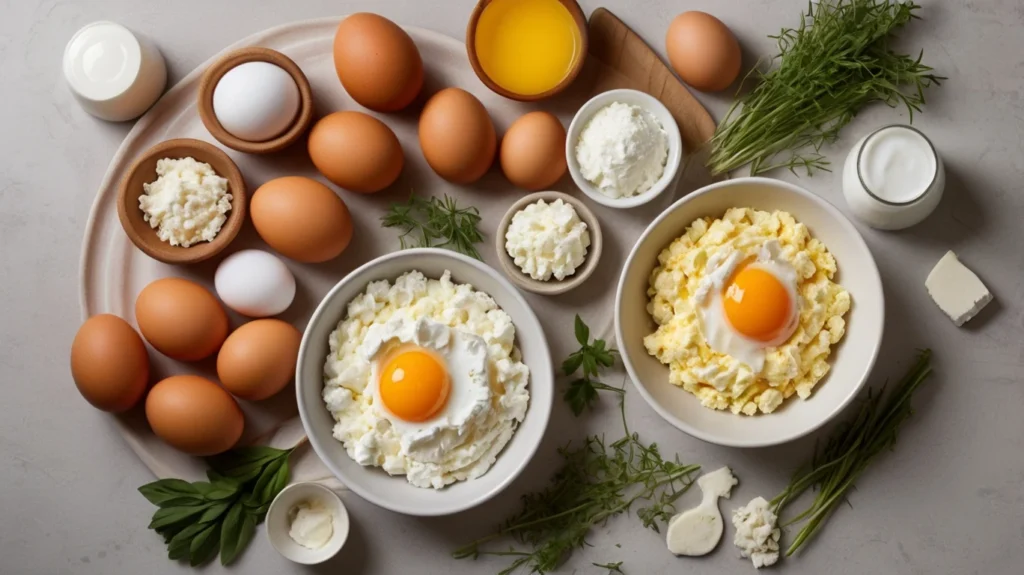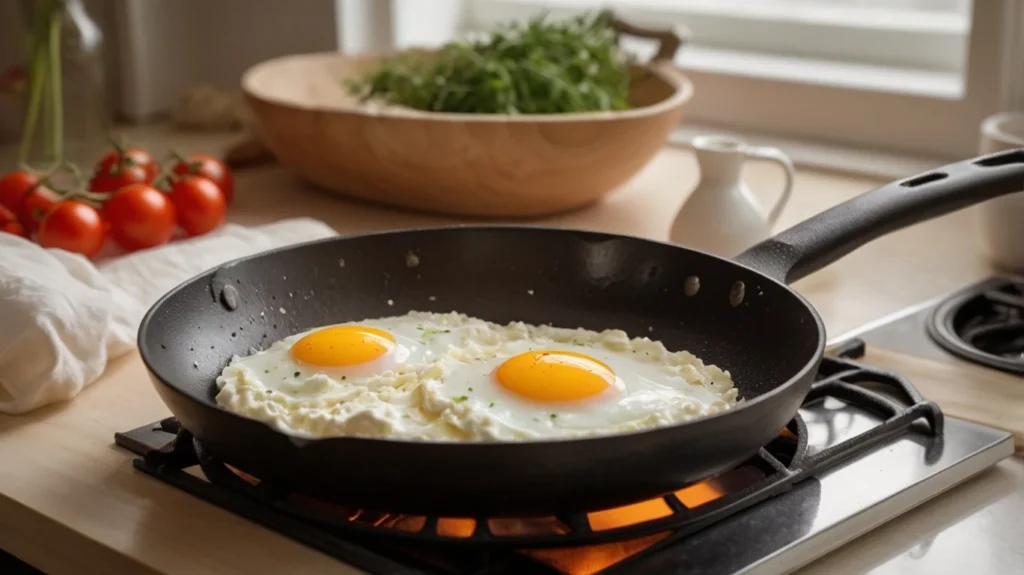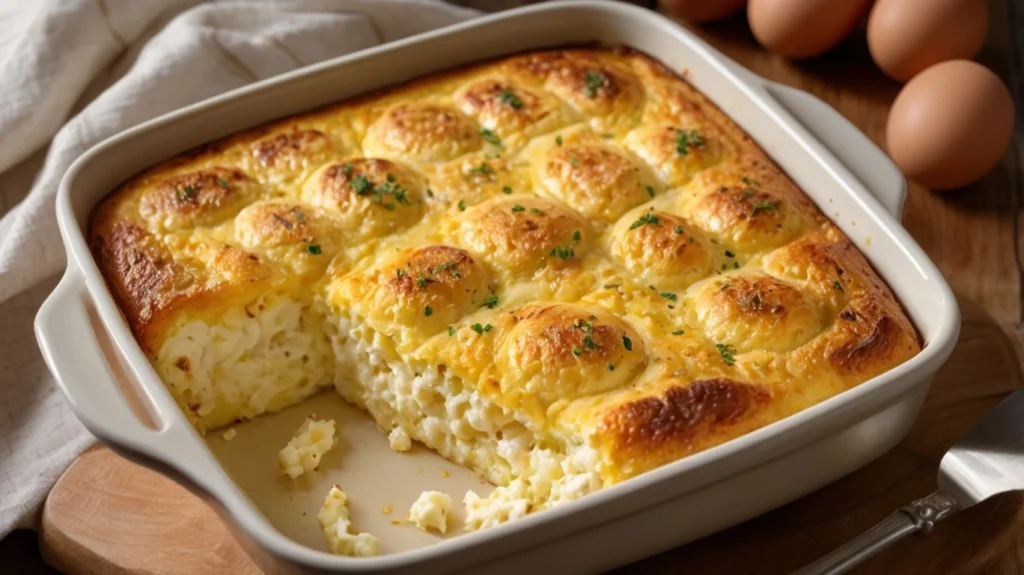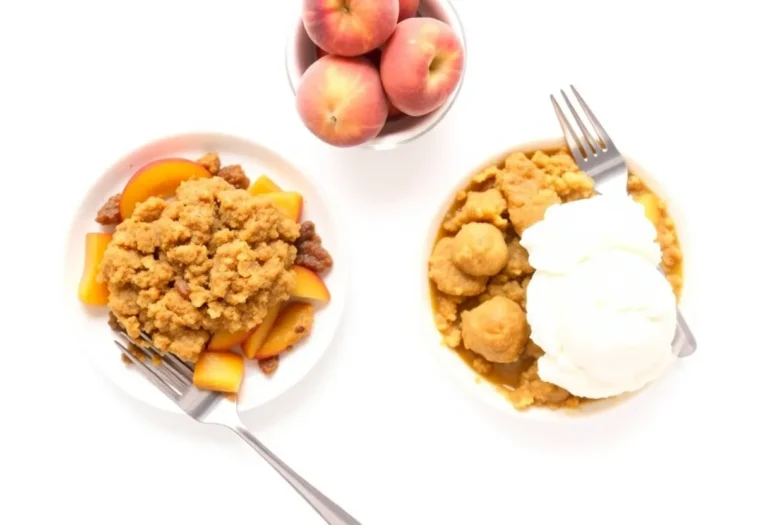Cottage Cheese Eggs Tips are essential if you want to avoid watery scrambled eggs. If you’ve ever tried making eggs with cottage cheese and ended up with a runny mess instead of a fluffy scramble, you’re not alone! But don’t worry—I’ve got you covered. Think of me as your culinary sidekick, your egg-whispering pal! Together, we’ll uncover the best tricks to keep your eggs creamy, delicious, and perfectly cooked.
Understanding the Cottage Cheese and Egg Dilemma
First off, let’s talk about why this even happens. It’s like, you’re all excited to make your breakfast, and then BAM! Watery eggs staring back at you. It’s a mystery, right? Not really. But, sometimes it feels like a mystery. It’s because there’s a little bit of science involved, but don’t worry, it’s not rocket science. It’s more like, egg science! We’re gonna break it down, nice and easy, like we’re just chatting over a cup of tea. We’re going to understand the cottage cheese and egg dilemma and then we’ll conquer it, together.
Common Reasons for Watery Eggs with Cottage Cheese
Okay, so, here’s the deal. Watery eggs usually happen because of a few different things, all working together like a bad team. First, cottage cheese is naturally pretty wet. It’s like a little cloud of moisture, just waiting to burst. And, when it heats up, it releases that water. In addition, eggs also have water in them, naturally. So, when you mix the two together and apply heat, it’s like a party for liquid to come out to play. We’ve all been there, right? You’re trying to make a delicious meal and it ends up a watery mess. It’s frustrating, I know, but we’re gonna fix it. However, there are ways around this, so do not give up hope yet.
What Does Cottage Cheese Add to Your Eggs?
Now, before you get all mad at cottage cheese, let’s talk about why we even bother adding it to our eggs. I mean, why go to the extra trouble, right? Well, it’s because cottage cheese is like a secret weapon for making our eggs even better. It’s not just about adding a little something extra. In fact, it can change the entire experience, in so many good ways. It’s one of my favourite tricks, especially if I want to impress someone! And don’t we all want to impress people, every now and then?

Flavor and Texture Benefits
First of all, cottage cheese adds this awesome creamy texture that makes your eggs taste so much more luxurious. It’s like adding a hug to your breakfast. Also, it adds a slight tanginess, that makes the flavour pop! It’s a wonderful contrast to the richness of the egg yolks. It’s like the sunshine and a gentle rain, all in one bite. And who doesn’t want sunshine in the morning? That texture alone is like a fluffy cloud in your mouth, making your breakfast feel like a real treat. I can almost taste it now, can you?
Nutritional Boost from Cottage Cheese
But wait, there’s more! Cottage cheese isn’t just about flavor and texture, it’s also packed with good stuff for your body. It’s a bit like a mini-superhero in the kitchen, ready to rescue you from boring breakfasts! It has things like protein, which keeps you full and happy, and calcium for strong bones. Plus, it is low in fat. So, you’re getting all that goodness without feeling guilty. It’s like a secret weapon for a balanced breakfast. So, it’s like a win-win, right? Yummy and good for you! Who could ask for anything more?
Protein and Calcium in Every Bite
Speaking of protein and calcium, let’s just give them a shout out! They’re like the dynamic duo of the nutrition world. Protein keeps you energized and full for hours, so you don’t get hangry before lunch. And calcium, well, we all know it’s super important for your bones. It’s like giving your body a little love with each bite. It’s like, you’re not just eating breakfast, you’re nourishing yourself from the inside out. Which, to be honest, we all deserve. So, go ahead, add that cottage cheese, you amazing human!
Why Eggs Turn Watery When Cooked
Alright, now let’s dig a little deeper into why eggs turn watery. It’s not magic, but it can feel like a magic trick gone wrong, right? It’s really just a matter of science. And don’t worry, we’re not talking about complicated stuff. It’s all pretty simple once you see how it works. Think of it like watching a magic trick being revealed; once you know how it’s done, it’s not so mysterious anymore. So, let’s demystify those watery eggs. We’re all in this together, remember?
The Science Behind Watery Eggs
Okay, here’s the science bit, but I promise, it’s not gonna be scary! You know how eggs are mostly water and protein? Well, when you cook them, the protein starts to change, and that’s what makes the egg turn from liquid to solid. However, when you heat the egg too fast or for too long, the water gets pushed out, and there you have it, watery eggs. It’s like they’re crying a little, from the inside out. And the cottage cheese just makes it worse because it adds even more water to the mix. So, it is basically like a science experiment in your kitchen, only sometimes it backfires. But, we’re here to learn from that, right?
Cottage Cheese’s Role in Egg Consistency
Now, let’s talk more about how cottage cheese plays its role in the watery egg drama. As we said, cottage cheese has water in it. This water is just waiting for a chance to get out, and when you heat it, that’s when the water comes out. So, adding it to your eggs is like adding fuel to the fire of watery disasters. But, here’s the thing, it doesn’t mean we can’t use cottage cheese in our eggs, we just have to know how to handle it. Think of it like a wild beast, beautiful but unpredictable; you have to know how to tame it. It’s just like life really; everything can be tamed, you just have to know how!
Moisture Content in Cottage Cheese
The level of moisture in cottage cheese really plays a big role. Some cottage cheese is drier than others. If you use cottage cheese that’s super watery, it will make your eggs even more watery. It’s like adding too much water to your bath; it just overflows! You want to choose a cottage cheese that’s more on the drier side. It can make all the difference between a watery scramble and fluffy perfection. It’s a small thing, but it can make the whole experience better. Which is like most things in life; small changes can make big differences.
Cooking Temperature and Technique
Another big reason why your eggs might be watery is your cooking temperature and technique. If you cook your eggs too hot, too fast, the water gets pushed out. It’s like they’re saying, “Help, it’s too hot in here!”. The trick is to use a low to medium heat, and be patient. Remember, good things take time. Cooking eggs low and slow will help them stay nice and creamy instead of watery. And isn’t that what we want? We’re going for perfection, or at least as close as we can get. We all deserve amazing breakfasts, right?
Key Tips to Avoid Watery Eggs
Okay, so now that we know what causes watery eggs, we need to learn how to avoid it! It’s like we’re about to become egg whisperers, able to control the fate of breakfast. And I can’t wait to share all my secrets with you. It’s like we’re a secret society of amazing cooks, ready to share the magic. And I am here to teach you everything I know. So buckle up, it’s time for our transformation.
Choosing the Right Cottage Cheese
First things first, let’s talk about choosing the right cottage cheese. As we said before, the moisture level makes all the difference. It’s like choosing the right kind of paint for a picture, it sets the tone for the whole piece. You wanna look for cottage cheese that’s labeled “low moisture” or “small curd.” These usually have less water. Think of it like choosing the right shoes for a walk; you want something that’s gonna support you and make the whole experience better. You can even pat the cottage cheese with a paper towel before you add it to your eggs, to remove even more moisture.
Adjusting Ratios for Perfect Results
Next, let’s talk about how much cottage cheese to use. Too much cottage cheese, means too much water! It’s a slippery slope, I tell you! You might need to adjust the amounts a bit, till you find what works best for you. For every two eggs, start with about 2 tablespoons of cottage cheese. That’s a good starting point, and then you can adjust if you need more or less. It’s like finding the right balance in a recipe; it might take a few tries, but you’ll get there, I know you will! And remember, every small adjustment is a step closer to perfection. So, keep at it!
Cooking at the Ideal Heat
Finally, let’s talk about the heat. Cooking eggs on low to medium heat is like giving them a gentle hug instead of a harsh squeeze. It gives them time to cook properly, without releasing all their moisture. It’s like gently coaxing them into being the best they can be. And who doesn’t like a gentle nudge in the right direction? It’s the slow and steady wins the race situation. Be patient, and trust the process. Your eggs will thank you for it.
Substitutions for Cottage Cheese in Recipes
Now, if you’re still worried about cottage cheese, there are other options, don’t worry. Maybe you want something similar, but not quite the same. Or, maybe you simply do not like cottage cheese, and that’s okay too. The great thing about cooking is that you can always experiment with new things. It’s like going on a journey of self-discovery; you never know what you’ll find! So, let’s explore these substitutions together.
Greek Yogurt as a Creamy Alternative
Greek yogurt is like the cool cousin of cottage cheese. It’s thick, creamy, and packed with protein. It adds a similar tang, but it’s often less watery. If you’re looking for a substitute that won’t make your eggs watery, then give it a try. It’s like a secret weapon in your kitchen, always there to save the day. Plus, it’s super versatile, so you can use it in other recipes too. It’s a win-win situation!
Low-Moisture Cheese Options
Another great option is to use other cheeses that have less moisture in them. Think about things like cheddar cheese or mozzarella cheese. These cheeses melt beautifully and add a lot of flavor without adding much water. It’s like discovering a new treasure chest; full of possibilities! Plus, cheese makes everything better, right? It’s a great way to get creative in the kitchen and make something truly unique!
Techniques for Perfect Cottage Cheese Eggs
Okay, now that we’ve covered all the basics, let’s talk about how to put it all together. It’s like the grand finale of our egg journey! And trust me, it’s going to be amazing! We’re going to transform into egg-making masters, ready to create the most delicious breakfast. I am so excited to show you all my favorite techniques! So, let’s get started! It’s like we’re embarking on an epic quest, and the reward is fluffy, delicious eggs!

How to Blend Ingredients for Consistency
First, let’s talk about how to mix the cottage cheese into your eggs. You don’t want to just dump it in, like it’s a free-for-all. You need to blend it carefully to make sure everything is mixed well. And here’s the thing, whisking the eggs with the cottage cheese before you put them into the pan is key! It’s like creating a smooth canvas before you start painting; it makes all the difference in the final result. It also helps the cheese and eggs bind together, so they don’t separate while they’re cooking.
Timing Matters: Avoiding Overcooking
Timing is everything when you’re cooking eggs. If you cook them too long, they get dry and rubbery. It’s like leaving a steak on the grill for too long; it’s not going to be as good. You want to take them off the heat when they’re still slightly moist. They will continue to cook a little bit while they’re still in the pan, so do not overcook them, ever! It’s like giving them a little time to rest and become perfect. And that’s what we’re all aiming for here, right? Perfection!
Balancing Cooking Times for Eggs and Cheese
When you add cottage cheese, you need to make sure you’re not cooking the eggs for too long. The cheese will cook really fast so you don’t want it to get burned while you’re waiting for the eggs to cook. Balance is key. It’s like a seesaw; you need to make sure everything is even. Watch your eggs and take them off the heat when they are just slightly set. It’s a dance between eggs and cheese, and once you find the rhythm, it’s magic!
Stirring Techniques to Prevent Separation
Also, make sure you stir your eggs gently and consistently while they cook. This prevents the eggs from sticking to the pan and helps keep the texture nice and even. Don’t over stir them, though! You want to be gentle, like you’re cradling a baby. It’s like you’re dancing with your eggs, and it’s a beautiful, beautiful dance. Also, stirring helps to stop the water from separating from the egg, so that the whole dish holds together nicely.
Creative Recipe Ideas with Cottage Cheese and Eggs
Okay, now that we have mastered the art of making perfect cottage cheese eggs, let’s talk about some creative recipe ideas! It’s like we’re about to go on a culinary adventure, exploring the world of yummy egg recipes! And I am your trusty guide! We’re going to explore the unlimited possibilities and come up with something amazing!

Cottage Cheese Scramble Variations
You know, just by adding some different flavors to your egg scramble, you can change the whole thing completely. We can add things like chopped veggies, or herbs, or maybe some spices to take it to the next level. How about adding some spinach and feta cheese, or maybe some mushrooms and onions. It’s like creating a unique piece of art; each ingredient adds something special and different. Or what about jalapenos for a bit of spice? The possibilities are endless!
Baked Cottage Cheese and Egg Casseroles
Another great idea is to make a baked casserole. It’s like a hug in a dish, perfect for a cozy brunch. You can mix your eggs and cottage cheese with some veggies, cheese, and maybe some bacon or ham. Then you bake it in the oven until it’s all bubbly and golden brown. It’s the perfect meal to share with family and friends, all around a table. It’s also a great way to impress someone, with very little effort.

Why Getting This Right Matters
Okay, so why does it all matter? Why put in the effort to make sure your eggs aren’t watery, and to ensure they turn out perfectly every time? It’s because sometimes, it’s the little things that make a big difference. And that tiny change from watery, to fluffy eggs, can change your entire day. It’s like taking the scenic route home; it’s a little more work, but it’s so worth it.
Enhancing Breakfasts with Perfect Eggs
A perfectly cooked egg can set the tone for your whole day. When you start your day with something delicious and nutritious, it makes you feel good and ready to tackle anything. It’s like putting on your favorite outfit; it just makes you feel better. And that feeling of accomplishment, knowing you made something amazing, that’s really priceless. Plus, who doesn’t love a yummy breakfast?
Impressing Guests with Flawless Dishes
And, it’s not just about you, sometimes it’s about others. Imagine being able to whip up a perfect egg dish for your friends or family. It’s like sharing a piece of your love with them, with every bite. And, you know, everyone loves a good meal. It’s a great way to bring people together. It’s like being a culinary superhero, ready to impress anyone who crosses your doorstep.
FAQs About Cottage Cheese Eggs Tips
Why Are My Cottage Cheese Eggs So Watery?
It’s because of the moisture in cottage cheese and how heat affects the eggs. But, don’t worry, we can fix it! We’re going to avoid those watery nightmares, for good!
What Does Cottage Cheese Do to Eggs?
Cottage cheese adds creaminess, protein, and a little bit of tang to the eggs, but if you don’t use it correctly, it can also make them watery. But now we have the knowledge to conquer that!
Are Watery Scrambled Eggs Safe to Eat?
Yes, they are safe, just not as delicious, lol. They just look a bit sad. You should always cook your eggs thoroughly. Safety is always first, deliciousness is a close second.
How Can I Fix Watery Eggs Mid-Cooking?
Unfortunately, it’s hard to fix watery eggs once they are watery. The best thing is to learn how to prevent them. But, you can always drain any extra water before you serve them.
Can I Make This Recipe Vegan or Dairy-Free?
Yes, of course! You can use things like tofu instead of eggs, and dairy-free cheese or yogurt instead of cottage cheese. The important thing is to be creative, and adapt it to your own needs. It’s like making a recipe your own.
What Are the Best Seasonings for This Dish?
That is completely up to you! Salt and pepper are always good, but you can add whatever you want! Garlic powder, paprika, chili flakes, the options are endless! Get creative!
What Cooking Mistakes Should I Avoid?
Do not use too much cottage cheese, cook on too high a heat, and overcook your eggs. Remember our tips, and you’ll have no problems.
And there you have it! Everything you need to know to conquer watery eggs and make the most delicious cottage cheese eggs! Go on, my friend, be the egg master you were born to be! You got this! Now, go on and make the most amazing breakfast you’ve ever had! I believe in you!
Follow Lazy Meal Prep on your favorite platform and become part of our cozy kitchen crew:
- Instagram – for behind-the-scenes peeks and weekday inspiration
- Facebook – to swap ideas, tips, and share what you’re cooking
- Pinterest – to save and plan your week the lazy-smart way
Let’s make cooking easier, together one delicious bite at a time.




